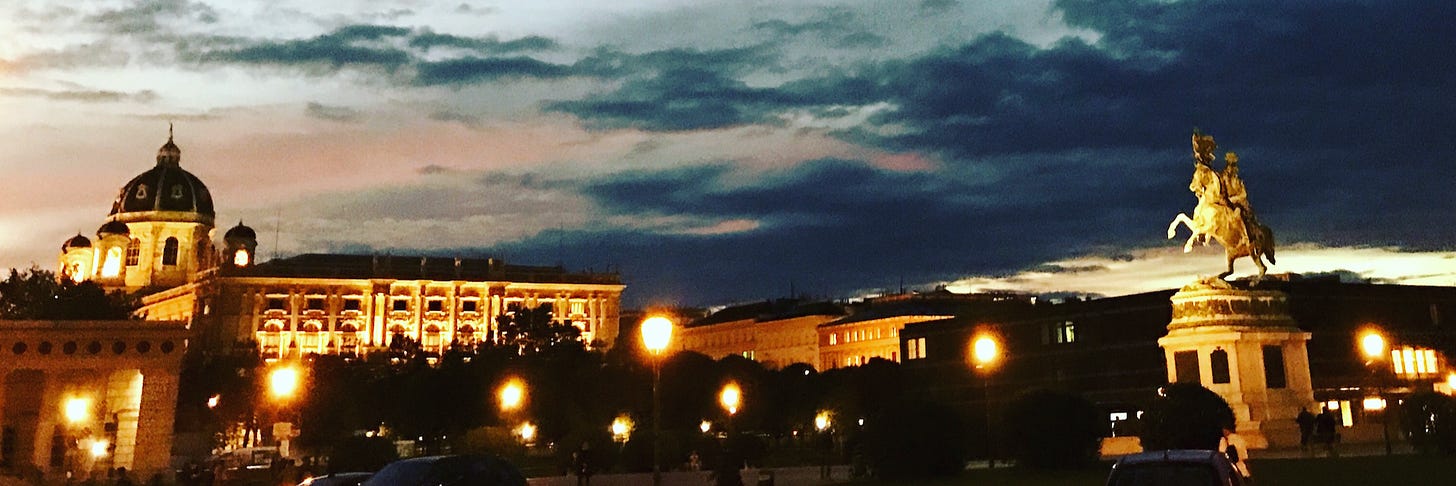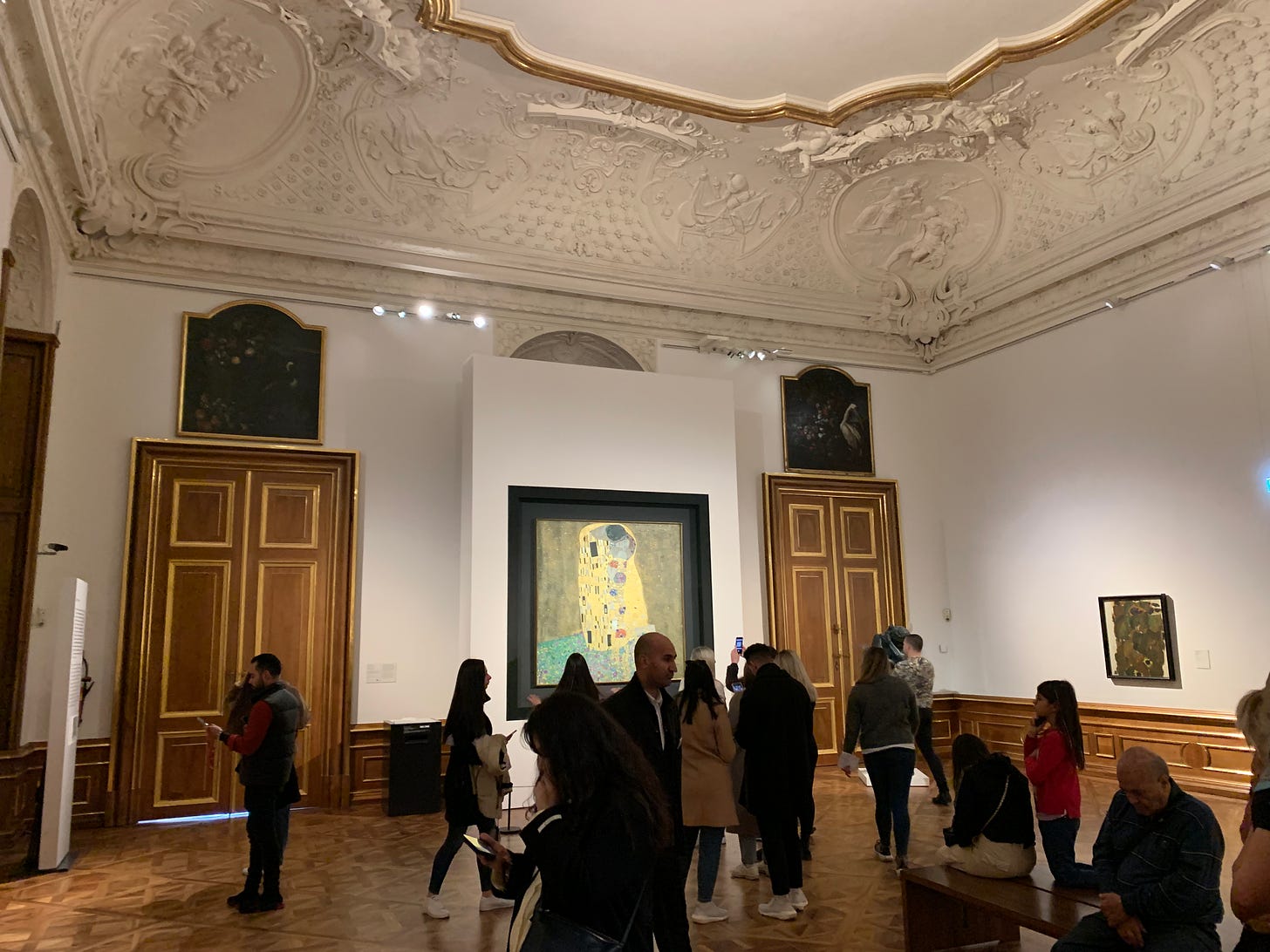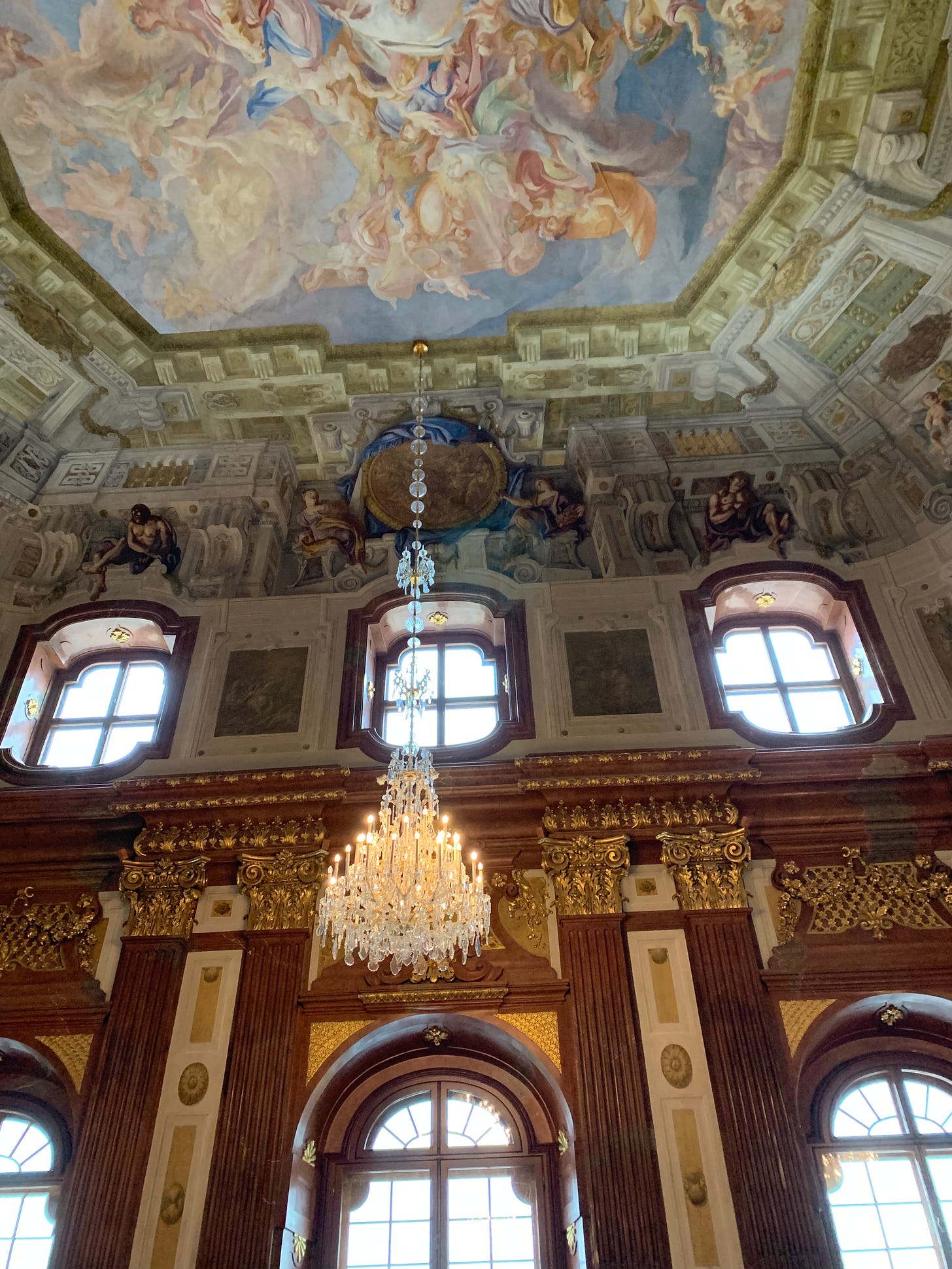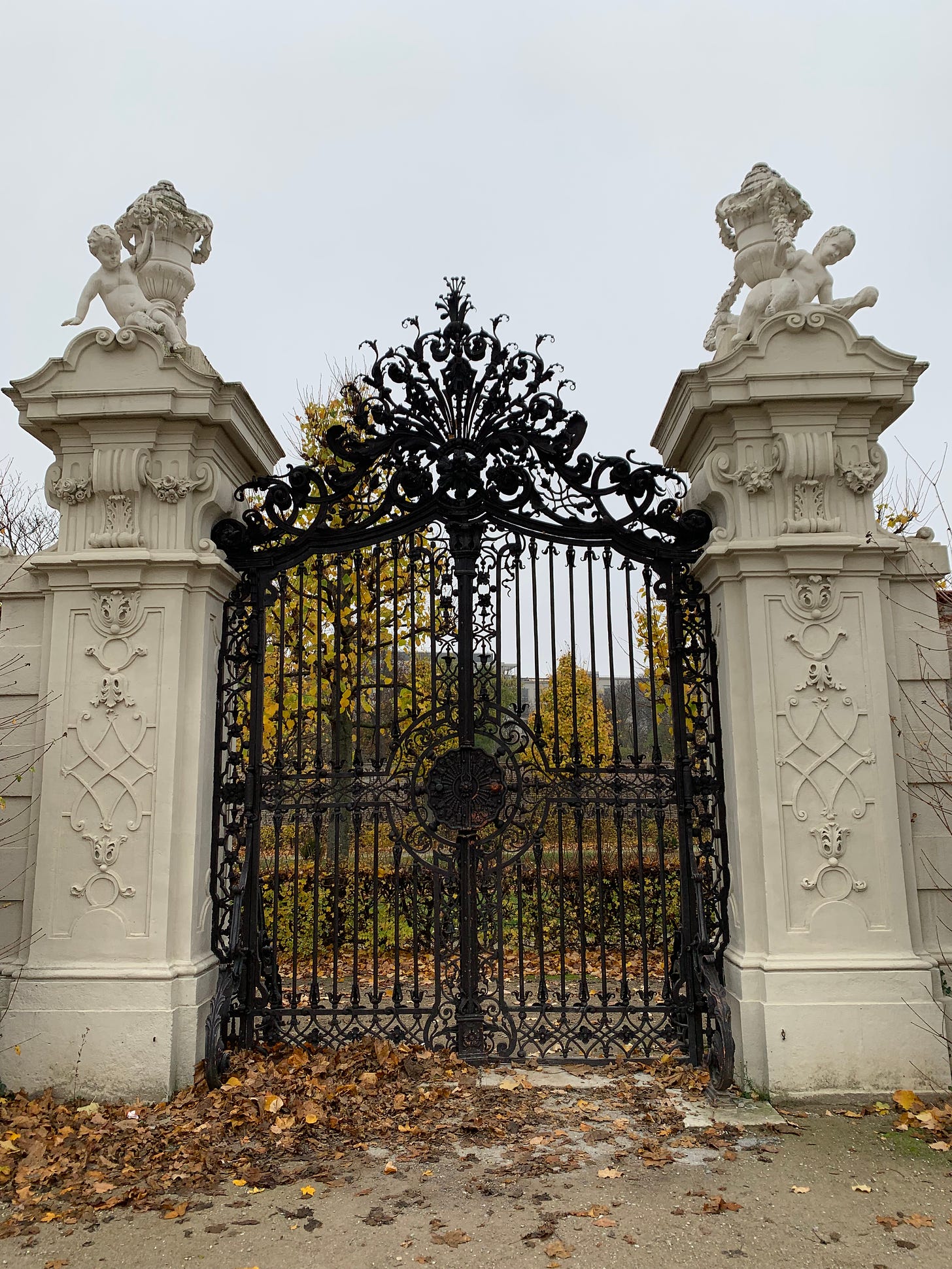An Interpreter in Vienna is a response to Graham Greene's The Third Man and a psychological thriller serialized on The Matterhorn each Saturday. This prose is a continuation of a letter written by Marie to her (official) employers in anticipation of Josef’s arrival at her door…at the threshold where she believes one of them will die.
∞ Table of Contents | Blurb
∞ Author’s Foreword
∞ Related Reading
Chapter 9
In the days ensuing, I expected to have more information from Fred and Roger. The absence of any such outreach made me question my memory. Even now, I wonder if it had just been a dream or a premonition.
Marija had finally asked to meet me, however, for a job. I was grateful for the work. Vienna isn’t that expensive, but I wasn’t making much money and also wanted to send a little bit home to Maman.
The Bulgarian embassy, where Marija also lived, was not far from the Belvedere Palace where Klimt’s “The Kiss” is housed.
I walked on strange new streets across the sixth, fifth, and fourth districts to the third. It was raining a little and the streets were dark. Their stones were weathered and the few people inhabiting them were already dressed for winter. My hard-soled leather shoes echoed through the wet air, slapping the wet pavement unnaturally.
The geometry of the city looked askew. It was as if I were viewing a German noir through a kaleidoscope; every building and person walking down the street was at a slightly different angle in my tunnel vision. One man walked directly into my space, as if I were a ghost, until I sidestepped into the street and a large puddle of water. He didn’t notice and carried on with the same cadence as if he, instead, were some kind of supernatural creature of the dark day.
The Belvedere Museum was on a strange mound of earth, formed in an irregular oval shape with gardens down below. Most of it was blocked from view with ugly stone walls painted a light yellow, but the entry through beautiful black gates was like a portal to another dream.
The fountains and gardens showed care as well as sparks of bright autumnal flowers that emerged from the gloomy day surrounding it all. It was rather empty, as it was only just after opening time on a Tuesday. I walked around the pond at entry, which revealed to me a more palatial view. Suddenly the angles moved back to perpendicular and the roundness also looked regular.
I knew Klimt’s “The Kiss” was here - somewhere - but had no idea what else to expect. The entrance to the palace museum led up a brilliant white marble staircase with angel cherubs and large black lamps adorning the passage. Eventually, it arrived at the Marble Hall with highly decorated windows and ceilings. I learned that the Austrian State Treaty was signed there on May 15, 1955, and then presented by Leopold Figl and Foreign Ministers of the Allied Forces to the public from its balcony. Austria was re-established as a sovereign state. My teachers hadn’t taught us much about this in school, lumping all Germanic geography into one post-Nazi lump.
In the next rooms, I found several paintings by Klimt, Schiele, Munch, and Monet. Each was a masterpiece. I stopped and soaked in their greatness momentarily, stopping dutifully at each and imagining myself in the scenes.
They led to a larger room that held “The Kiss.” A small crowd was gathered in front of it though there were few people in the museum. They were taking selfies or posing as if in deep bohemian thought. I started with the other paintings in the room, most of them also by Klimt. Finally, I got up close to the gold abstract portrait of a couple in love. There was something much more raw in this painting in real life. Reproductions, digital or on postcards, flattened the work into gold and lines. But here, one could see the intricate brushstrokes, creating a kind of intimacy with the subjects. I was drawn mainly to their hands and arms surrounding each other in unnatural and even desperate ways. Of course, their position would have been carefully mapped out in an underpainting but somehow Klimt managed to make them look haphazard, as if done in a moment to convey a mood.
A small adjacent room was strikingly different. Pastoral scenes instead of painted figures adorned the small, square space next to a glass opening over the palace chapel, visible through a tiny window, as if some secret space to pray.
At first glance, they looked like Monet’s work. There were elements of impressionism and subjects like his own in the countryside of France. I recognized a faint tinge of Japonisme style also shown through the works like many of Monet’s. The strong diagonal lines with a flattened perspective were clear. But the technique especially of the flowers and rooftops here was more detailed and the scenes decidedly Austrian. Farmhouses were half covered by trees. Meadows with flowers reached up and around the rectangular composition like many of Klimt’s figures. These were Klimt’s views of his city and country. They were both markers of nature and that of a rich and fertile time in the Austrian Empire during the early twentieth century.
One more room lay before the exit. It held works again by Klimt and Schiele, as well as others, but instead, the subjects were people looking isolated by their experiences or sad about the future of the world. There was one by Oswald Roux called “Evening Bells” that showed a farmer at work, but he looked fatigued and lonely. They were completed during the first world war and I guess their mood reflected that of the empire.
I returned to the pastoral room before my exit, wishing these blissful images to fill my mind rather than the haunting scenes of the last. Then I noticed something – the pattern I had seen on Julie’s wall was embedded in the paintings. A purple and green design created a tunnel of trees leading to Schloss Kammer in one of Klimt’s smaller works. This was exactly how she had created a pastoral image. I was drawn in, almost hypnotized, by the surreal yet natural image. It was as if I had entered Klimt’s consciousness. I was beginning to understand why his work was so valuable. I think one must witness art in person to see it.
In that room, too, I learned that Klimt had died from the influenza pandemic in 1918 with complications from pneumonia. He had died at the age of fifty-five with many works incomplete. At least he had created beauty to be cherished by the world for a long time, I reasoned. As we are still in the current pandemic as I write this, I wonder if I can do something good before it is too late.
I suddenly felt like I was being watched. I was sitting on a museum bench, and somebody came up behind me, close. I guess a lot of people would want to look at the particular painting, but the museum was fairly empty. I took out my phone and opened the camera to view the person behind me. It was a woman in a long black dress. She looked at my phone, and therefore at me. There was some kind of familiarity about her. I didn’t dare turn around, but she spoke in English: ‘I wish I could disappear into that painting, don’t you?’
The accent sounded Viennese, so I was surprised she was speaking in English. I must have looked like a foreigner, a tourist. I didn’t answer, simply nodding toward her and leaving the room to descend the large marble staircase.
Finally, it was time to meet Marija. My palms were sweating in anticipation. I still didn’t know exactly what the nature of her side business was. I wanted to be on time but not early and continued to check my phone for how long it would take to walk there, even though I knew it was just six minutes.
As I left the palace grounds, the terrain again looked uneven and uncanny. The sidewalks were empty as were the streets besides trams that tottered by every few minutes up and around the oblong estate. Moving downhill slightly, my motion was mechanical, propelled by gravity. I was approaching a huge intersection called Schwarzenbergplatz and there to the left, I saw the white, green, and red horizontal stripes of the Bulgarian flag down Schwindgasse.
The building was unremarkable, like all the others nearby, but it was unremarkable in its imposingness. The tall light-gray stone facade like the others, columned and ornate around the large windows emerged from the pavement without foliage or colored adornment apart from the flag.
Unlike some of the embassies, there was no armed guard outside. I rang the bell and waited. Alone, I thought about the nature of this work: what line might I be crossing as I entered the threshold? I started to question if I had even had these small conversations with Marija or if it was entirely a fabrication of my desire for something more. Eventually, the door opened, and a diminutive old woman greeted me, ‘Grüß Gott! Folgen Sie mir.’
She turned on her heels and I followed her as directed. My steps echoed through the long hallway with several closed doors on each side until we reached a final one at the end, which she opened with military flair, standing aside to usher me in.
The door had been like all the others, dark and unmarked, but the other side held a huge colorful sitting room and library with a marble spiral staircase to the left.
A man was sitting on one of the red armchairs with a newspaper covering his face that looked like it was in Russian or at least a language using the Cyrillic alphabet, which I guess could have also been Bulgarian.
He slowly lowered the paper to fold it neatly and place on a nearby heavily varnished table, then suddenly sprung to his feet, his face immediately transitioning to a smile.
‘Marie? Apologies, I take my reading very seriously. Welcome!’
‘Hello, thank you. You must be Marija’s husband?’
‘Yes,’ he laughed, ‘that is how most people refer to me. My name is Finn.’
‘Lovely to meet you.’
‘And you. I have no idea what Marija is up to, but she’s happy to have you working for her now.’ I nodded. He was speaking in perfect English with just a slight accent that I couldn’t place. ‘’Would you like a coffee? I make very good coffee!’
‘I don’t want to trouble you.’
‘Oh, it’s no trouble at all, I was just reading the paper and it can wait.’
‘Thank you then, yes.’
He left me alone in the room a short time after excusing himself and my eyes traveled over the many books on the shelves.
The short, frumpy-looking jolly man sprang back into the room with a tray carrying two small coffees. He had those kind of eyebrows that reach up and out into the sky like cat fur.
‘I see you like to read! Here, sit down. They are all fascinating creatures…my wife, I don’t really know what she does.’
He laughed again and I responded by asking him what he did for work.
‘I am lucky. I have money — and I live in the free world. I just go to state functions and stay out of politics. I write books but I have to publish them under a pseudonym.’
‘Oh—‘
‘I’m Swiss, you see. We are famously neutral, but I imagine you know a little about the Bulgarian state…politics, if they can be called that.’ He motioned all around with his eyes and I imagined he meant we could be listened to. ‘Anyway, I don’t worry much. My books have nothing to do with allegiances to Russia, but it’s best to keep things simple for everyone, especially Marija. I wouldn’t want to jeopardize her career, so I stay fairly invisible,’ he paused quizzically, ‘Like your job I guess. Am I right?’
‘Yes…how astute.’
‘Besides some writing, I manage the family money. I have to go back to Bern for this quite often.’ And then more softly, ‘or at least that’s what I tell Marija! Ha. But she’s happy to have space from me so it works quite well. I go to stay with my sister or at our family house in the mountains. Switzerland is such a happy place.’
‘I’ve only been to Geneva once.’
‘Ah, I see. Beautiful city. A bit boring, though. I had to expand my world with books.’ He motioned to his collection again, ‘I learned English and French, then Russian, to learn more about the wide world than limiting myself to German books had to offer. I guess that was also how Marija and I connected. Do you read Russian literature?’
‘A little. I love Tolstoy. Who are your favorites?’
‘Oh, I love the old greats! But I also like some modern writers like Vladimir Sorokin and Tatyana Tolstaya. Nobody ever talks about them.’
‘You’re right, I’ve never heard of them.’
‘Want to borrow something for your train ride? You are off to Budapest, right? Have a look at that bookshelf. Take anything.’
I started to look at the books but they were written in the Cyrillic alphabet.
‘Sorry, but I can’t read Russian.’
‘Oh, of course! Silly me, I forget about these things. This entire shelf on the right is in English, the left one is in German. Do you like reading in English?’
‘Sure.’
‘Have you read Gargoyles by Bernhard? It’s about these crazy Austrians!’ he laughed, ‘People locked in basements, old crazy counts on hilltops, that kind of thing. But the guy is Austrian…so he can get away with it. Have you read it?’
‘Yes, I loved it.’
‘Good, then you’ll like this one, too. It reminds me of Dostoyevsky. Have you read Notes from Underground?’
‘I don’t recall it.’
‘Please, take it with you.’
We drifted into literary conversation for several minutes over coffee.
When Marija came down the spiral staircase in their two-story apartment, his entire demeanor changed. He didn’t look up at the grand entrance, but he closed the book and quickly handed it over to me as if he wished he had done it earlier. I took it, graciously, but kept an eye on Marija, as if not trusting her movement. She was simply dressed: black pants, black boots, a light brown cashmere sweater, and bright lipstick instead of jewelry. But there was something in the way she moved silently down that made me wonder what her secrets were.
Finn was no longer as carefree. He spoke to her in Russian. It sounded like a conversation of question and answer where he was on the defensive.
Marija then finally acknowledged my presence: ‘Hello Marie. Enchantée. I see you’ve met my husband, Finn. I hope he’s been nice to you,’ she smirked.
‘Yes, thank you. Nice to meet you as well. He’s just been showing me some books.’
‘Dostoyevsky!’
‘Ah yes, It’s their sickness that everyone takes pride in. Hmm, Finn is really into his books.’ She said this in French as if to shut out her husband.
Finn didn’t get up when we left and instead, Marija had to go over to his armchair and stoop down to kiss him. It looked more like a show than real affection or a hope for desire to come. Or maybe, it was just a cultural thing.
When we got outside, Marija warmed as if the house had constrained her.
‘Ah, I’m so happy to be getting out. My work keeps me inside so often; being an ambassador is a job of many interiors that all blend together. Have you been to Budapest before?’
I hadn’t.
‘November is so dark and grim here. In Budapest, they have the same weather but the city is alive. You’ll see. We’ll stay at The New York Palace. Did I mention we would stay over? I forget, as this whole thing is so last minute.’
‘Oh, no you didn’t, but I’m happy to. I don’t have to be at the UN tomorrow.’
‘Great! You can buy an outfit and toiletries on my account. Well, you’ve met Josef. I’m trying to accomplish something meaningful with him, much more important than greeting people in foyers and that kind of thing.’
‘I’m happy to be a part of it.’ I didn’t dare ask what it was.
I felt at that time that Marija genuinely cared for me, like a protégé of sorts, and that she respected me as an intellectual equal.
That feeling slightly dipped when she asked me to carry her bag and book us an Uber to the train station. She then proceeded to make a couple of quick phone calls without apology as if I weren’t there. I had put her bag on the floor to book the Uber, which she saw out of the corner of her eye while on the phone. She pointed and wagged her finger, which I understood to mean get it off the floor. I placed it on the table as I finished and in between calls she sharply interrupted her Russian with sharp French: ‘Don’t ever put that Prada on the floor,’ which in turn reminded me I was likely to carry her bag again. I guess if I had a Prada, I wouldn’t put it on the floor either.
⬩
The train was different from the Austrian trains, like something you would see in The Grand Budapest Hotel. It made me feel like we were in that world of strange characters and unclear motivations. We sat in first class, an old train car containing little rooms with two long leather booths each. The hallway was like a meeting place of personalities. We sat together, on the same side, while Marija took several more calls in Russian and an old man across from us began smoking by the mechanical open window. He gave a nod after taking off his hat, as if from another era. Rules I was used to seemed to be reinvented here.
More and more, I began viewing my life as a film. I was somehow outside of it looking in, as if the character I was playing was already predetermined. It made it more interesting to live this way. I wasn’t sure who was controlling the movements — Marija, Josef, those I assumed were British spies, you two, a god (even though I don’t believe in gods)? I thought, there must be some director somewhere getting annoyed if I didn’t look convincing enough, so I tried to pour my whole heart into it.
Paradoxically the disassociation elevated my experience. Everything felt richer in this world where I was a key player in some unknown mission.
I looked out the window to daydream about the seductive dangers I was about to encounter in Budapest.
To be continued…
Find all the published chapters in the Table of Contents. And if you enjoyed hearing more about Klimt this week, check out my recent podcast on paintings in fiction.










‘Don’t ever put that Prada on the floor,’
best line. 😅
Seriously though, the amount of details, allowing us to soak up Vienna in all its glory – it is a UNESCO World heritage Centre after all – paired with the intrigue as we follow Marie on her journey towards... murder, it's truly a film noir unfolding on page!
Thanks to you, I felt like I was in the museum, absorbing the beauty, mystery, and technique of the art. Also, Marija reminds me of a few traits I have witnessed. Quite a forceful, fascinating character! Poor Finn, though.